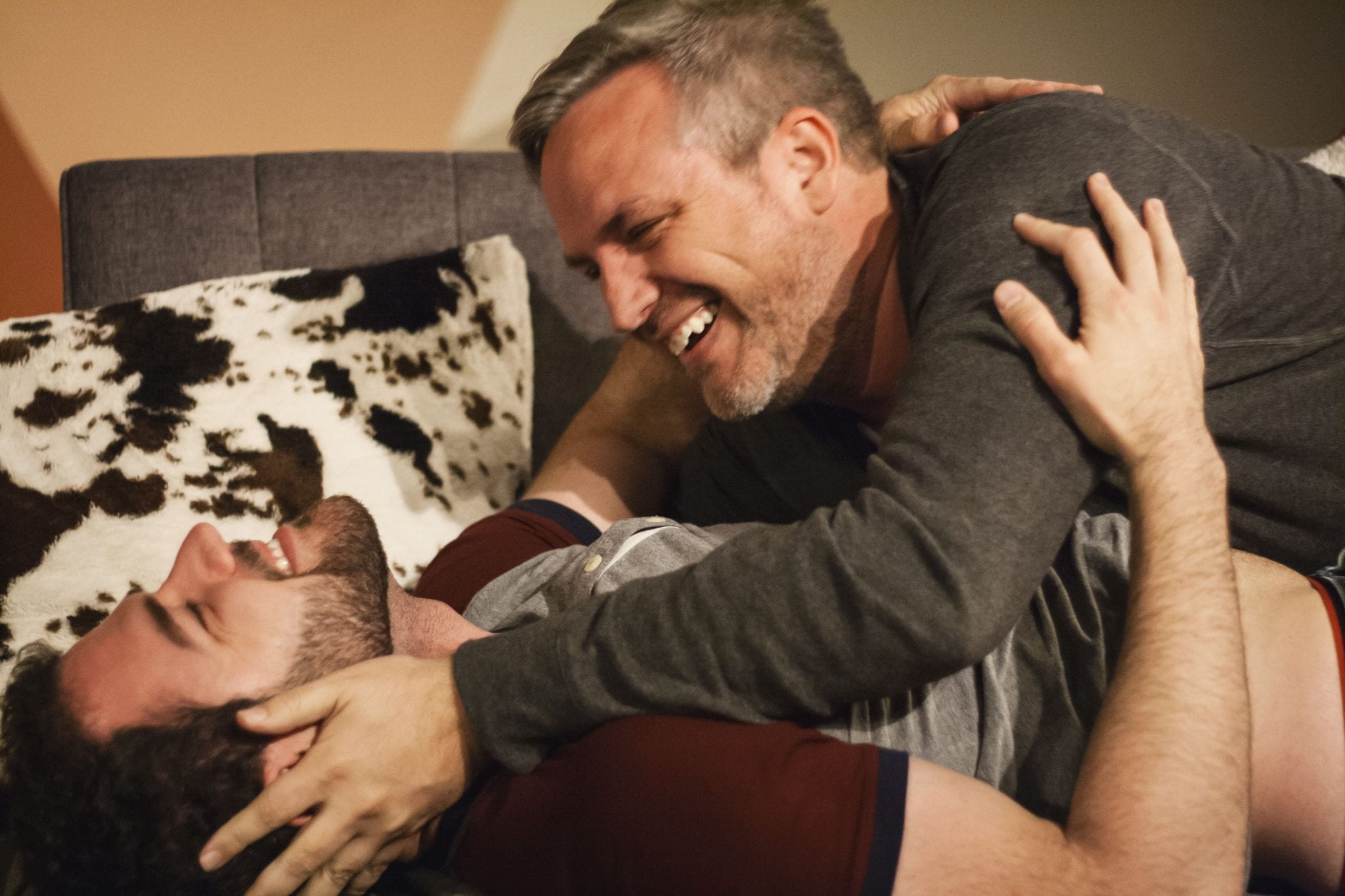PROVO — Luke and Adam are a couple, living together in New York City. When Luke (played by Abram Yarbro) is seriously injured, his separated parents, Butch and Arlene, arrive. There are two sets of conflicts in the play: Luke is a religious fundamentalist, while Adam is at best agnostic; the parents don’t know about their son’s sexual orientation. So, is this Next Fall about religious conflicts, or a play about sexual conflicts? Mixing the two seems to get in the way of a resolution on either count.

The irresolution is not the fault of the actors, all of who acquit themselves well and are generally believable, to the extent that the two situations are believable. Director Kacey Spadafora has managed his resources well, but the script leaves Next Fall without a general appeal.
To begin with, the relationship between Luke and Adam (played by Brett Merritt) is supposed to be sustained over a five-year period, but how is never explained very clearly. The two have nothing in common, other than their homosexuality. With the differences in belief and temperament that Luke and Adam display, it is hard to believe that this relationship could last more than a few weeks. Moreover, playwright Geoffrey Nauffts‘s view of religious fundamentalism are simplistic and unlikely. No doubt, it is easy to draw broad caricatures of fundamentalists, but Nauffts also fails to give Adam’s agnosticism any nuance. The philosophical discussions between the two feature a lot of clever, comic, and witty dialogue, but the resulting lightness seem somewhat at variance with the seriousness of the subject matter.

The crux of the religious conflict comes with Luke’s insistence on “praying after sex.” This discomfits Adam, but it is no less unsettling for the an audience member to watch. It is hard to imagine exactly what Luke would be praying for. Thankfully, he prays silently, so what just went on in that other room is left to the audience’s imaginations. On the other hand, had Luke prayed vocally, his beliefs and motivations would be much clearer.
The story of Adam and Luke is not told in a linear fashion. While his family and friends wait outside his hospital room, the audience sees flashbacks over the past five years, from the time that Luke and Adam meet to the time of the accident. These flashbacks include occasional visits from the parents to the couple’s apartment. Luke, the religious fundamentalist, has not told his family about his sexuality. This conundrum makes it awkward when Butch and Arlene visit, and after he is injured and his family comes to his bedside from Florida.
The dynamics of a mourning couple coming to terms with the sexuality of a dead son also do not quite work out here. It seems pretty evident that Arlene (played by Heather Oberlander) knows her son’s secret, but Butch (played by Joel Applegate), may still be in denial. In that respect, the play is far less satisfying than Carol Lynn Pearson’s Facing East, which deals with a similar situation, with Mormonism replacing Christian fundamentalism as a complicating factor. In that play, the situation played out to a resolution of sorts.
Next Fall tells essentially a four-person story, so it is not clear exactly what Luke’s friend Brandon (played by Brian Kocherhans) adds. He is homosexual, but prefers black men, so he and Luke were presumably not past lovers. Adam’s employer at the candle shop, Holly (played by Alexis Boss) adds even less to the story, though Boss and Kocherhans both played their parts well.
In 2018, this kind of coming-out play is increasingly passé. As time passes, it gets harder to imagine that most fundamentalists would not at least suspect the truth of a son’s sexuality, especially after he moves to New York and fails to report progress toward marriage. (And with the legalization of same-sex marriage, Adam’s exclusion from the hospital would no longer be possible.) What I mean is that this kind of conflict may disappear, at least at the formal level. With same-sex couples populating frequently appearing on television programming to the point that they are incidental (such as on CBS’s Instinct), it will not be long before Butch’s uneasiness will be as odd and hard to understand as Nelly Forbush’s in South Pacific has been for the last 40 years. What will likely become truly odd is anyone portrayed in the theater who takes religion seriously. In that respect, Next Fall may be on the cutting edge. But is that is a step forward?
An Other Theater Company plays in a store front, more or less bereft of the kinds of stage areas that make mounting a play convenient. Under those circumstances, the company always does well, with creative sets and props. For this show, contemporary New York costumes (designed by Ash Knowles) were pretty easy, and sets and props (designed by Janice Chan) were satisfactory, given the company’s limitations and budget. It’s hard to re-create an intensive care room in an old Radio Shack shop, but most audience members will be willing to suspend disbelief. Perhaps the day will come when we’ll be back to Shakespeare’s bare stage.
If you’re looking for any real exploration of the religious differences between fundamentalists and agnostics or atheists, you will not find it in Next Fall. And if you are looking for a cutting-edge treatment of the “coming-out” dilemma, there is not much of that here either.
[box]Next Fall plays at An Other Theater Company (Suite 2008 in the Provo Towne Mall) at 7:30 PM on Fridays and Saturdays though May 26, with an additional performance at 2 PM on May 19. Tickets are $13. For more information, visit www.anothertheatercompany.com.[/box]
Donate to Utah Theatre Bloggers Association today and help support theatre criticism in Utah. Our staff work hard to be an independent voice in our arts community. Currently, our goal is to pay our reviewers and editors. UTBA is a non-profit organization, and your donation is fully tax deductible.
